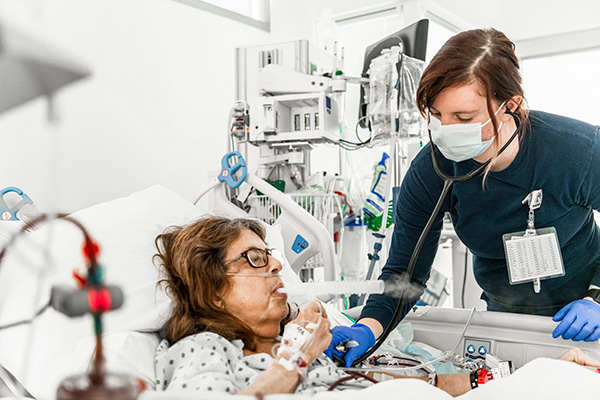Overview

What does a respiratory therapist do?
Respiratory therapists (RTs), also known as respiratory care professionals (RCPs), are trained to work cohesively with the healthcare team in the assessment, treatment and monitoring of patients with cardiopulmonary diseases.
Respiratory therapists also perform many diagnostic and therapeutic procedures, including:
- Administering inhaled aerosol medications to help alleviate breathing problems and prevent respiratory infections.
- Operating various types of highly sophisticated equipment to administer oxygen or to assist with breathing.
- Initiating and managing mechanical ventilation in patients who can’t breathe adequately on their own.
- Maintaining a patient’s artificial airway — one that may be in place to help a patient who can’t breathe through normal means.
- Monitoring and managing therapy to help a patient recover lung function.
- Performing pulmonary function tests.
- Obtaining and analyzing blood gas samples.
- Educating the patient about their disease process, treatments and the medication their physician has prescribed.
Cleveland Clinic Respiratory Therapy Enterprise is one of the world’s largest and most highly respected academic respiratory therapy collaboratives. It provides evidence-based clinical care to some of the most critically ill patients in the United States. Respiratory therapists at Cleveland Clinic provide care to the adult, pediatric and neonatal population. They also strive to advance the science and profession of respiratory care and work to promote the education of patients and our medical professionals. Our respiratory therapists serve 18 locations including the Cleveland Clinic main campus, all regional hospitals and free-standing emergency departments 24/7, totaling more than 900 RTs.
What We Treat
Respiratory therapists provide the skills to evaluate, treat and care for patients across the healthcare system, including those with:
- Asthma.
- Bronchitis.
- Cystic fibrosis.
- Emphysema.
- Lung diseases.
- Post-operative support.
- Pediatric and premature neonatal care.
Locations
Ohio Hospitals
Florida Hospitals
Resources
Respiratory Care Web Resources
Visit the following sites for helpful information about respiratory care.
- American Association for Respiratory Care.
- The National Board for Respiratory Care.
- Ohio Society for Respiratory Care.
- American Society of Critical Care Medicine.
- American Thoracic Society.
- American Heart Association.
- American Lung Association.
- The International Society for Heart and Lung Transplantation.
- State Medical Board of Ohio.
Research & Clinical Trials
Respiratory therapy physicians who specialize in pulmonary and critical care medicine, as well as staff respiratory therapists and researchers perform basic science and clinical studies to improve respiratory therapy protocols and treatments.
Respiratory Therapy Research
Our research focuses on lung simulators, workflow, and management processes and protocols. We also test new and existing ventilation devices to determine their effectiveness in treating patients.
Some of our best research tools include our fully-integrated electronic medical records, electronic documentation and data management systems, which allow us to consistently track our outcomes and conduct valuable research measurements. Such research allows Cleveland Clinic respiratory therapists to stay current in their field and be up-to-date on the latest pulmonary techniques.
For Medical Professionals
Respiratory Therapy Opportunities
We invite you to join our team and experience the continued growth and advancement of the respiratory therapy profession in our world class institution. This is a historic time to be a team member within the Cleveland Clinic Foundation as we celebrate our 100th year of providing care to the state of Ohio and the world.
Opportunities to work in specialty areas
We have an ongoing orientation process for preparing therapists to work in specialty areas, such as:
- Adult critical care (cardiovascular, medical, surgical, neurology)
- Critical care transport
- Neonatal intensive care
- Pediatric intensive care
- Pulmonary function lab
- Emergency department care
- Cystic fibrosis care
- The flexible staffing pool
Work at the top of your license
In addition to traditional therapy, we also provide the following advanced practices:
- Mechanical ventilator management and weaning.
- High-frequency oscillation
- Noninvasive positive pressure ventilation (NPPV)
- Arterial line insertion
- Bronchoscopy assistance
- Critical care transport
- Extra corporal membrane oxygenation (ECMO)
- Nitric oxide and epoprostenol administration
How to apply
If you desire to work in an environment that provides you with the opportunity to practice at the top of your licensure, we ask that you review our current openings and apply to what best fits you and your skills.
Applicants must be registered or registry-eligible with an Ohio license, or be respiratory therapy students with the appropriate license.
For Students
Interested in learning more about career opportunities for respiratory therapists?
Please visit our Respiratory Therapist Career Options page for more information about how to become a respiratory therapist and helpful online resources.
Education requirements
Respiratory therapists are licensed healthcare professionals who must graduate from a fully accredited school offering either an associate’s degree (two years) or a bachelor’s degree (four years). There are currently 15 associate and three bachelor programs accredited in the state of Ohio.
The general curriculum includes courses in anatomy and physiology, biology, chemistry, math and core respiratory therapy courses. Training is done in a variety of classroom, laboratory and clinical settings.
New graduates are required to obtain state licensure to practice respiratory care and must obtain the registered respiratory therapist (RRT) national board credential within one year of graduation.
Respiratory Therapy Programs Affiliated With Cleveland Clinic
Cleveland Clinic currently provides clinical rotations to respiratory therapy students at the following Colleges and Universities:
- Kent State University Satellite Program at Cleveland Clinic Main Campus
- Bowling Green State University
- Cuyahoga Community College
- Kent State University
- Lakeland Community College
- North Central State College
- The Ohio State University
- Stark State College of Technology
- The University of Akron
- Youngstown State University
Respiratory Therapy Scholarship Program
The Respiratory Institute is offering a Scholarship Program to anyone aspiring to become a respiratory therapist. It’s an opportunity for those who may be faced with financial hardship yet wish to pursue a professional healthcare career.
For questions regarding the Cleveland Clinic and Kent State University Program Partnership, contact Karla Balasko, Enterprise Director, at balaskk@ccf.org.